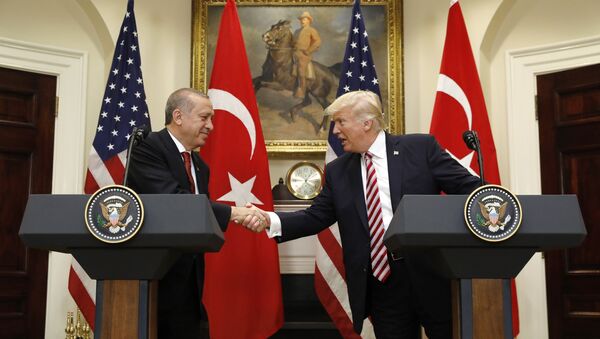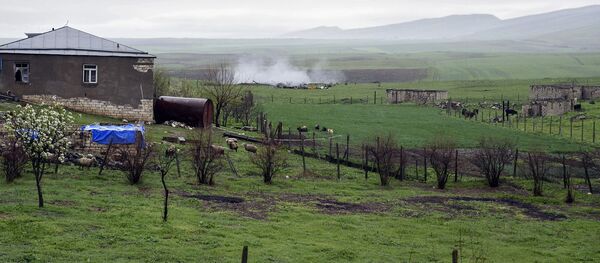WASHINGTON (Sputnik) — According to Matthew Bryza, the United States and Turkey should establish a mechanism of consultations between senior officials of both countries to improve their bilateral relations, since a "personal meeting between US President Donald Trump and Turkish President Recep Tayyip Erdogan will not help to settle the problems." The diplomat believes that US and Turkey's leaders are unlikely to understand each other's feelings and concerns.
READ MORE: Unresolvable Contradictions: How the US and Turkey Parted Ways
Bryza suggested that it could be a format similar to the meetings between Russian presidential aide Vladislav Surkov and US Special Representative for Ukraine Negotiations Kurt Volker, who "have to come together to talk through difficult issues."
Volker was appointed US Special Representative for Ukraine Negotiations in early July soon after Russian President Vladimir Putin and US President Donald Trump met in Hamburg. Since then, Volker and Surkov have held a number of talks, focusing on the Ukrainian crisis, with the most recent meeting being held on Monday.
Relations between Ankara and Washington have significantly worsened in recent months amid a number of issues, such as the problems related to Islamic cleric Fethullah Gulen, who has been living in the US state of Pennsylvania, and is accused of a coup attempt by Turkey, US support of Syrian Kurdish People's Protection Units (YPG) and diplomatic row between Ankara and Washington.
In October, the State Department announced the suspension of all non-immigrant visa services at US diplomatic missions in Turkey after the arrest of US Istanbul Consulate employee Metin Topuz over his alleged affiliation with FETO, a terrorist group which belongs to US-based Islamic cleric Fethullah Gulen. Ankara slammed the decision, and stopped visas services for Americans at its missions in the US in response.
Turkish Stream
Matthew Bryza, who is a board member of Turkey's Turcas Petrol gas distributing company, told RIA Novosti that he regarded the construction of the Turkish Stream gas pipeline not only as a geopolitical but also as an economic project though the primary motivation is still geopolitical.
Speaking of the project's benefits from Russia's prospective, the diplomat noted that the Turkish Stream would allow Russian gas transit to Europe to bypass the use of Ukrainian facilities, thus saving billions of dollars per year in transit fees.
READ MORE: Diplomatic Drama: 'This is Certainly the Biggest Crisis in US-Turkish Relations'
The subsequent thaw in Moscow-Ankara relations, following Turkey's apology, led to conclusion of a bilateral intergovernmental agreement in October 2016, envisioning the construction of two underwater legs of the Turkish Stream gas pipeline in the Black Sea, as well as a leg, laid on the ground. The pipe-laying work under the project is expected to end by late 2019.
The Turkish Stream pipeline has crossed into Turkey’s exclusive economic zone in the Black Sea pic.twitter.com/b2EVA7e8kL
— RT (@RT_com) November 7, 2017
US-Russian Relations
Amid the setback in relationship between Washington and Moscow, Matthew Bryza noted that the positive cooperation with Russia was not considered as a goal in Washington, but the situation should improve in the future.
READ MORE: US Hopes Relations With Russia Have Already Reached Low Point
As a perfect example of possible close cooperation between Moscow and Washington, Bryza, who also served as US ambassador to Azerbaijan and US mediator of South Ossetia and Abkhazia conflicts, cited the joint efforts to resolve the conflict in Nagorno-Karabakh.
"We are completely opposing each other on the Georgia conflicts, but completely together on Nagorno-Karabakh," Bryza said.






